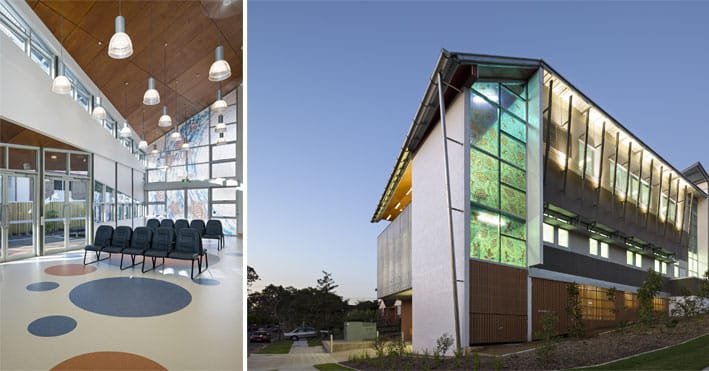The recently completed Southern Queensland Centre of Excellence in Aboriginal and Torres Strait Primary Health Care is the brainchild of Associate Professor Noel Hayman and his team. Designed by Hames Sharley, the centre plays an important role in providing mainstream health services to Indigenous Australians and a place for the community and healing.

Over the past two decades, Dr Hayman and his team have changed the lives of many Aboriginal and Torres Strait Islanders across Queensland. Dr Hayman established the Inala Indigenous Health Service in 1995 and has seen a considerable increase in demand for services ever since. His team provide a community based general practice service focused on improving the health of Aboriginal and Torres Strait Islanders while increasing the participation rate of Indigenous Australians accessing mainstream health services. In its first year, the service had 12 patients who attended fewer than 900 GP consultations. Today the clinic has approximately 8,000 patients who attend 20,000 consultations each year.
Hames Sharley, working closely with Dr Hayman and his team, designed a facility which complements its use as a place for the community and of healing. The building is inspired by an uplifting sense of being, expressed in an ambitious and unapologetic Queensland style.
Project Director, James Edward Curnow from Hames Sharley said the project was embraced as a health care centre which would have a greater role in bringing the community together. Creating a place that didn’t feel institutional was important for Dr Hayman and his team.
“The building is significant in its suburban context, yet the use of materials and somewhat informal composition, seek to imbue a sense of humility. It was never envisioned as a monumental building, although we certainly wanted it to have a strong presence in the community,” says Mr.Curnow.
The Indigenous community has a unique and strong connection to their environment. One of the key objectives was to take advantage of the surrounding natural environment by maximising the number of spaces which had a physical or visual connection to the outdoors.
Hames Sharley’s design borrowed elements from the structures of Queensland’s early colonial years, the building composition seeks to celebrate elements of Queensland’s past while embracing modern and adventurous forms.
The main entry features a significant artwork by local Aboriginal artist Anthony Walker, sheltered by angular steeply pitched roof forms with generous overhangs. It also features a light-filled stairwell with artwork by renowned Torres Strait Islander artist Billy Missi.
The three main sections reflect one the most important design features of the building; the appropriate segregation between patient and staff circulation. Patients wait at the eastern end of the building, whether inside or in the courtyard. Patients are then brought into the centrally located clinical spaces with staff able to access each floor via the western circulation corridor. Acute treatment spaces and utility spaces are located in the middle of the floor plate. Consult spaces are located on the northern and southern walls to take advantage of daylight penetration while also enabling occupants to switch between air conditioning and natural ventilation.
Now fully operational, the Southern Queensland Centre of Excellence in Aboriginal and Torres Strait Islander Primary Health Care is making a significant contribution to national Indigenous health reform through the development of best practice models of care.